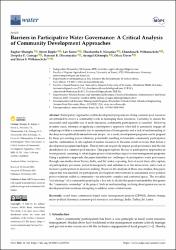Please use this identifier to cite or link to this item:
https://hdl.handle.net/20.500.11779/1760Full metadata record
| DC Field | Value | Language |
|---|---|---|
| dc.contributor.author | Shunglu, Raghav | - |
| dc.contributor.author | Withanachchi, Chandana Rohana | - |
| dc.contributor.author | Kibaroǧlu, Ayşegül | - |
| dc.contributor.author | Köpke, Sören | - |
| dc.contributor.author | Kanoi, Lav | - |
| dc.contributor.author | Nissanka, Thushantha S. | - |
| dc.contributor.author | Gamage, Deepika U. | - |
| dc.date.accessioned | 2022-04-04T11:37:40Z | - |
| dc.date.available | 2022-04-04T11:37:40Z | - |
| dc.date.issued | 2022 | - |
| dc.identifier.citation | Shunglu, R., Kopke, S., Kanoi, L., Nissanka, T. S., Withanachchi, C. R., Gamage, D. U., ... Kibaroglu A. (February 28 2022). Barriers in Participative Water Governance: A Critical Analysis of Community Development Approaches. Water, 14(5), 762, pp.1-24. https://doi.org/10.3390/w14050762 | en_US |
| dc.identifier.issn | 2073-4441 | - |
| dc.identifier.uri | https://doi.org/10.3390/w14050762 | - |
| dc.identifier.uri | https://hdl.handle.net/20.500.11779/1760 | - |
| dc.description.abstract | Participatory approaches within development programs involving common-pool resources are intended to revive a community’s role in managing these resources. Certainly, to ensure the successful and equitable use of such resources, community participation is essential. However, in many cases, attempts at applying a participatory approach often fail to genuinely engage all subgroups within a community due to assumptions of homogeneity and a lack of understanding of the deep socio-political divisions between people. As a result, development programs can be plagued by these pre-existing power relations, potentially resulting in tokenistic community participation and the continuation of elite capture of natural resources to the same extent or worse than before a development program has begun. This in turn can negatively impact good governance and the fair distribution of a common pool resource. This paper explores the use of participatory approaches in water projects, assessing to what degree power relationships impact water management programs. Using a qualitative approach, the paper identifies key challenges of participatory water governance through case studies from Turkey, India, and Sri Lanka, exploring: lack of social trust, elite capture of participatory processes, power heterogeneity and imbalances at the micro-level, and a lack of inclusive participation in decision-making. Based on the analysis of these case studies, this paper argues that it is essential for participatory development interventions to understand socio-political power relations within a community—an inherently complex and contested space. The so-called “exit strategy” of a community project play a key role to decide the project sustainability that grants the “community ownership” of the project. Such an understanding can bring about greater success in development interventions attempting to address water-related issues. | en_US |
| dc.language.iso | en | en_US |
| dc.publisher | MDPI | en_US |
| dc.rights | info:eu-repo/semantics/openAccess | en_US |
| dc.subject | Exit strategy | en_US |
| dc.subject | Sri lanka | en_US |
| dc.subject | Turkey | en_US |
| dc.subject | India | en_US |
| dc.subject | Social trust | en_US |
| dc.subject | Climate change | en_US |
| dc.subject | Common-pool resources | en_US |
| dc.subject | Micro-political dynamics | en_US |
| dc.subject | Community-based water management projects (cbwm) | en_US |
| dc.title | Barriers in Participative Water Governance: a Critical Analysis of Community Development Approaches | en_US |
| dc.type | Article | en_US |
| dc.identifier.doi | 10.3390/w14050762 | - |
| dc.identifier.scopus | 2-s2.0-85125848976 | en_US |
| dc.authorid | Ayşegül Kibaroğlu / 0000-0002-9648-5975 | - |
| dc.description.PublishedMonth | Şubat | en_US |
| dc.description.woscitationindex | Science Citation Index Expanded - Social Science Citation Index | - |
| dc.identifier.wosquality | Q2 | - |
| dc.description.WoSDocumentType | Article | |
| dc.description.WoSInternationalCollaboration | Uluslararası işbirliği ile yapılan - EVET | en_US |
| dc.description.WoSPublishedMonth | March | en_US |
| dc.description.WoSIndexDate | 2022 | en_US |
| dc.description.WoSYOKperiod | YÖK - 2021-22 | en_US |
| dc.identifier.scopusquality | Q2 | - |
| dc.relation.publicationcategory | Makale - Uluslararası Hakemli Dergi - Kurum Öğretim Elemanı | en_US |
| dc.identifier.endpage | 24 | en_US |
| dc.identifier.startpage | 1 | en_US |
| dc.identifier.issue | 5 | en_US |
| dc.identifier.volume | 14 | en_US |
| dc.department | İİSBF, Siyaset Bilimi ve Uluslararası İlişkiler Bölümü | en_US |
| dc.relation.journal | Water | en_US |
| dc.identifier.wos | WOS:000768070000001 | en_US |
| dc.institutionauthor | Kibaroğlu, Ayşegül | - |
| item.grantfulltext | open | - |
| item.fulltext | With Fulltext | - |
| item.languageiso639-1 | en | - |
| item.openairetype | Article | - |
| item.openairecristype | http://purl.org/coar/resource_type/c_18cf | - |
| item.cerifentitytype | Publications | - |
| crisitem.author.dept | 04.04. Department of Political Science and International Relations | - |
| Appears in Collections: | Scopus İndeksli Yayınlar Koleksiyonu / Scopus Indexed Publications Collection Siyaset Bilimi ve Uluslararası İlişkiler Bölümü Koleksiyonu WoS İndeksli Yayınlar Koleksiyonu / WoS Indexed Publications Collection | |
Files in This Item:
| File | Description | Size | Format | |
|---|---|---|---|---|
| water-14-00762-v3.pdf | Full Text - Article | 4.97 MB | Adobe PDF |  View/Open |
CORE Recommender
SCOPUSTM
Citations
26
checked on Nov 23, 2024
WEB OF SCIENCETM
Citations
18
checked on Nov 23, 2024
Page view(s)
58
checked on Nov 18, 2024
Download(s)
18
checked on Nov 18, 2024
Google ScholarTM
Check
Altmetric
Items in GCRIS Repository are protected by copyright, with all rights reserved, unless otherwise indicated.